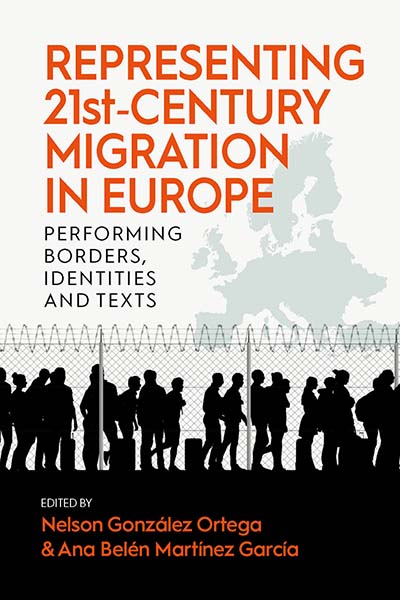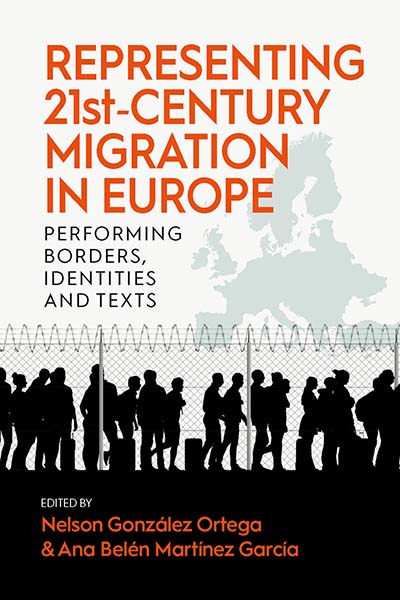
ANA BELÉN MARTÍNEZ GARCÍA is Associate Professor at ISSA School of Applied Management, University of Navarra (Pamplona, Spain). She teaches Business Communication, Academic Writing, and World Literatures in English.
In this exclusive interview, in conversation with her intern Arantza Morales (final year in Literature and Creative Writing undergraduate at the University of Navarra), Ana Belén explores the inspiration and issues behind her coedited book, REPRESENTING 21ST-CENTURY MIGRATION IN EUROPE: Performing Borders, Identities and Texts.
ARANTZA MORALES: Congratulations on this volume. Before we start, could you tell us a bit more about the context and how this book came to be?
ANA BELÉN MARTÍNEZ GARCÍA: This book was published in February 2022, but it had been long in the making. I’m really proud to have been a part of it. In fact, the coauthors in the book first got together in a symposium organized by a group of researchers (among them, Nelson, my coeditor) at the Department of Literature, Area Studies and European Languages (ILOS) of the University of Oslo, in Norway. I have very fond memories of that event. We were all humanities scholars working in the field of migration and narrative but from different approaches. Since we all first met in 2018 several projects have come out, one of them being the present volume with Berghahn. I thank the UiO team for their encouragement. Back then, I was an early career researcher with little experience in editing books, having managed to publish impactful but not that many journal articles, and I’ll always be grateful for their invitation.
Thinking back to the chronology of the book, I think 2019 was key. The book project was coordinated by the Oslo team, while we all pitched ideas for our chapters, looking to mold our contributions into a coherent whole. Seeing as we were a diverse bunch, made of literary critics, linguistics professors, critical theorists, but also people from media studies, law, and the arts, it was a challenge. In the end, the first choice for co-editor declined in the midst of the pandemic, and I took up Nelson’s kind invitation with a mind to help the book project see the light. And we did it! I’m so glad we worked hard over a rough nine months to put the manuscript together and implement the proposed improvements by our reviewers.
AM: How did you meet your co-editor? What was he like?
ABMG: Nelson González Ortega (1952-2022) was Professor of Hispanic Literatures at the University of Oslo. Born in Ibagué (Colombia) in 1952, he did his BA in Literature at Stockholm University (Sweden). He taught Spanish as well as Spanish literature at Alberta, in Edmonton (Canada) and Madison, Wisconsin (US), where he did his MA and PhD in Hispanoamerican Literature. Prior to Oslo, he also taught at University of Santo Tomás, University of Nariño, and Umeå University.
Sadly, it was not long after our virtual book launch last February 2022 that he passed away. We just heard about it from his former colleagues, since he had by then retired. Nelson was a kind soul, most welcoming and helpful with younger scholars, always open to suggestions and new ideas.
AM: What was the decision behind the four parts?
ABMG: This is one of Nelson’s main accomplishments, for he saw clearly that the volume could be standing on solid theoretical ground, by either separating key concepts to study migration from a humanities lens, geographical gateways into Europe, or genres. I think he would have actually preferred using the idea of gateways, but we put it up for a vote among the editorial board members, and we agreed the third option was the most sensible one, even if we would within our pages remind the readers that all those three readings were still possible and enlightening, of course.
AM: In what ways does having different media help tell migrants’ stories?
ABMG: I think this is vital. Multiple other books have dealt with migration in the past. Even as we speak, more and more are being produced on the subject. Yet, the trend is for research fields to be rigid, and rarely do we find efforts to put together narratives of various kinds, such as we do here: novels, essays, memoirs, testimonies, TED talks, films, news images and articles, visual arts, and performance arts. Whether fiction or nonfiction, we were all interested in engaging with the representation of migration and of migrants, their identities, how they are produced and negotiated across borders of all sorts, both physical and not. The fact that all the contributors also worked as peer reviewers for each other, meant that we kept the conversation going until we were all happy with the final outcome. We learnt a lot from each other.
AM: What did you learn while co-editing the book?
ABMG: I honed my proofing skills. It’s helped me see what a manuscript can offer, how an argument can be enriched, and also, and crucially, how interdisciplinary research is key to making an impact in the real world, beyond academia.
AM: You also wrote Chapter Five as well as the book’s conclusion. What was your approach in each of those?
ABMG: In Chapter Five I discuss how Nujeen Mustafa, a Syrian activist, deploys traditional as well as innovative narrative to construct her identity as a border-crosser. I close-read her memoir alongside her TED talk, identifying characteristics shared and tips for future research on migrants’ texts. For my analysis, I rely on Border theory but also, true to almost all of my research on life writing so far, on Judith Butler’s theory of performativity, tracking how the “I” is being created and why.
As for my “conclusion”, I must say it is not quite the typical conclusion one might get in other books. As advised by our blind referees during the reviewing process, that made for a quite boring, dull piece. Instead, they challenged me to engage with the theme of migration and narrative more broadly, thinking forward, proposing what might lie ahead. And I took it up. I pored over the work of recent scholars writing about migration, and thought out loud, really, about ways of moving forward together. Ever since then, I envision the future of the humanities as doing research that matters and, much like the activists I study, trying to make this world a better world. We cannot just analyze injustice and then switch off.
AM: How does all this relate to your current research interests?
ABMG: I keep writing about migrants’ auto/biographical texts, both online (e.g. social media) and offline (e.g. documentaries, autobiographies, etc.). I am interested in listening to how they decide to present themselves, and how we can in turn help make their stories reach the public. I’m now part of a COST Action (HIDDEN), seeking to tell Human Stories for Humane Reactions, collaborating with a group of researchers from fields as diverse as history, human rights, sociology and cultural anthropology, to assess how best to communicate these narratives so their impact is longlasting. We hope this project will shed light on practices of belonging, empowerment, and empathy, hopefully reaching policymakers and social justice for the most vulnerable.
AM: The book is definitely an interesting read for anyone looking into migration in the twenty-first century, not only in Europe, but across the globe, but who else do you think would benefit from reading it?
ABMG: I think our target reader is mostly made of humanities undergraduates or recent graduates who, by looking at our examples, may think whether doing research in the humanities might not be worth a chance. We need all hands on deck if migration as a so-called crisis and so many other contested terms want to be countered and new practices brought to the fore.
ANA BELÉN MARTÍNEZ GARCÍA is a member of the International Auto/Biography Association (IABA), the International Society for the Study of Narrative (ISSN), and the English Studies Association in Spain (AEDEAN). She collaborates with the Bonds, Creativity and Culture hub at the Institute for Culture and Society (ICS) at her institution. Her work has appeared in publications including Journal of Writing in Creative Practice, Narrative, a/b: Auto/Biography Studies, and Life Writing. Her first book, New Forms of Self-Narration: Young Women, Life Writing and Human Rights (Palgrave, 2020), was nominated as best book 2020-2022 in the category of Literatures in English by the European Society for the Study of English (ESSE). She has written about performativity and identity, activism online and offline, and her latest work revolves around migration and testimonies.

REPRESENTING 21ST-CENTURY MIGRATION IN EUROPE
Performing Borders, Identities and Texts
Edited by Nelson González Ortega and Ana Belén Martínez García
250 pages, 14 images, bibliog., index, 2022
Hardback 978-1-80073-380-0
eBook 978-1-80073-381-7
For the latest news on our books and journals please sign up for our email newsletters.
